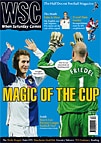 Many people would struggle to place the home city of CFR Cluj on a map, but the club could be hosting Champions League matches next season. Andy Hockley reports on an unlikely stirring in Transylvania
Many people would struggle to place the home city of CFR Cluj on a map, but the club could be hosting Champions League matches next season. Andy Hockley reports on an unlikely stirring in Transylvania
As Romania’s league enjoys its two-month winter break, an unfamiliar name occupies top spot in the table. The club are 100 years old, but their recent rise has been nothing short of dramatic.
CFR Cluj were formed as a railway club in 1907, in what was then Hungary, as Kolozsvári Vasutas Sport Club (KVSC). In 1918, when Transylvania became part of Romania, the name changed to CFR Cluj (CFR being the name of the Romanian state railway). The club have had a fairly inconspicuous history, spending most of their life in the second and third tiers of Romanian football, aside from a brief period of relative success in the early 1970s. Indeed as recently as 2001 they were flirting with the fourth tier and were even unable to afford to buy any balls. It was then, however, that local businessman Árpád Pászkány stepped in.
The city has a traditionally bigger club – Universitatea (“U”) Cluj – and it was this team that Pászkány first attempted to invest in. However, Romanian-Hungarian ethnic tension still exists in Transylvania, not least in Cluj, its capital under Hungarian rule. An extreme Romanian nationalist mayor of the city spent much of his term of office attempting to rid Cluj of as much evidence of its Hungarian past as he could. In this climate, U Cluj rebuffed Pászkány’s advances on the grounds that he was part Hungarian. So he put his money in CFR and within three years they were promoted to the top flight. Last season, under the coaching of first Dorinel Munteanu and subsequently the Italian Cristiano Bergodi, they finished third, qualifying for the UEFA Cup.
Much of CFR’s recent success has been obtained on the back of Pászkány’s money paying for the arrival of a number of foreign imports, most notably a contingent of Portuguese players who arrived last season. However, with Bergodi poached by Rapid Bucharest in the summer, suspicions were that the success might prove to be fleeting. The early exit in the UEFA Cup seemed to bear this out, but to everyone’s surprise CFR have gone from strength to strength under new boss Ioan Andone. So successful have they been that at the halfway point of the season unbeaten CFR held an eight-point lead.
The Portuguese contingent have been augmented with Swedes, Argentines and Brazilians, bought for, in Romanian terms, very high fees, and reportedly on high wages. CFR have also garnered a reputation for terrace harmony, with the club being given fanatical support by progressive Romanians and Hungarians alike – a very real advance.
In contrast, Bucharest’s big three are apparently going backwards under the weight of fan and owner expectations. Dinamo sacked Mircea Rednic, so successful last year, and replaced him with Walter Zenga, who has since also departed. Steaua started the season under the guidance of Gheorghe Hagi, but the national hero quit, citing the impossibility of working with the club’s notorious egomaniac patron Gigi Becali, who’s also the leader of an extreme-right political party. Hagi’s replacement, Massimo Pedrazzini, lasted slightly longer, but was quickly replaced by Marius Lacatus. Bergodi was soon shown the door at Rapid, replaced by Rednic.
As a result, the title race is open as never before, and there is a real chance that CFR and another team – possibly unfashionable Unirea Urziceni, coached by Dan Petrescu, or perennial underachievers Poli Timisoara – can grab the money-spinning European spots. There are recent signs, however, that the Bucharest teams are beginning to rouse from their slumber. Rapid are now only five points shy of CFR, whose last match before the winter break also resulted in their first defeat – at Poli Timisoara.
The Bucharest teams, having failed to see off CFR on the pitch, are trying to do so off it, with innuendo about match-fixing (blackly ironic coming from clubs such as Steaua and Dinamo) and thinly veiled attempts to appeal to Romanian nationalism. But the repeated dismissal of CFR as a “Hungarian” club has very little basis in reality – while Pászkány himself is part Hungarian, very few of the backroom staff are and absolutely none of the players is.
With the Romanian league title this year guaranteeing direct passage into the Champions League group phase, it may well be that the rest of Europe may soon be learning of the remarkable rise of CFR Cluj.
From WSC 252 February 2008